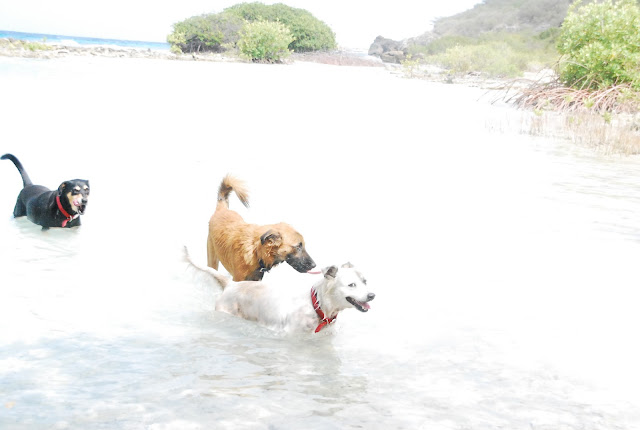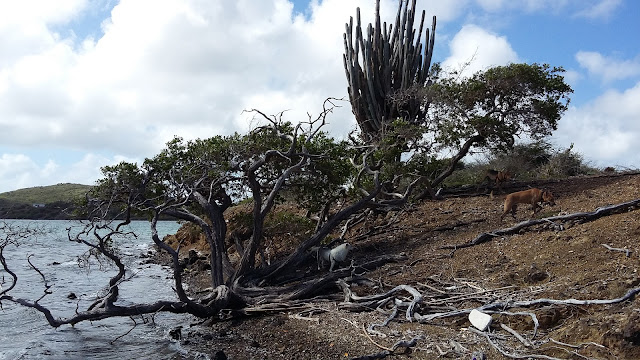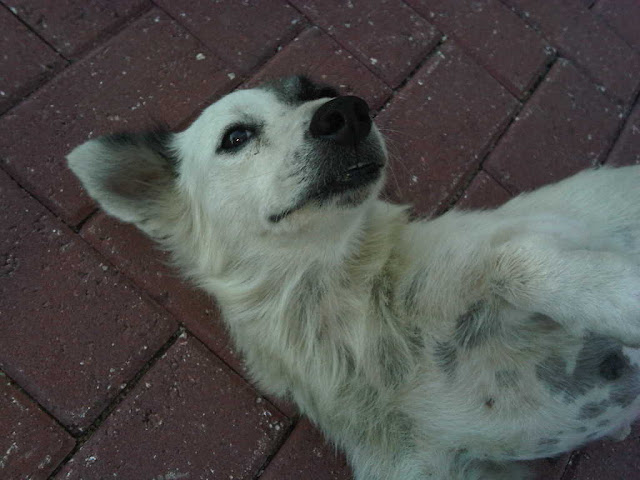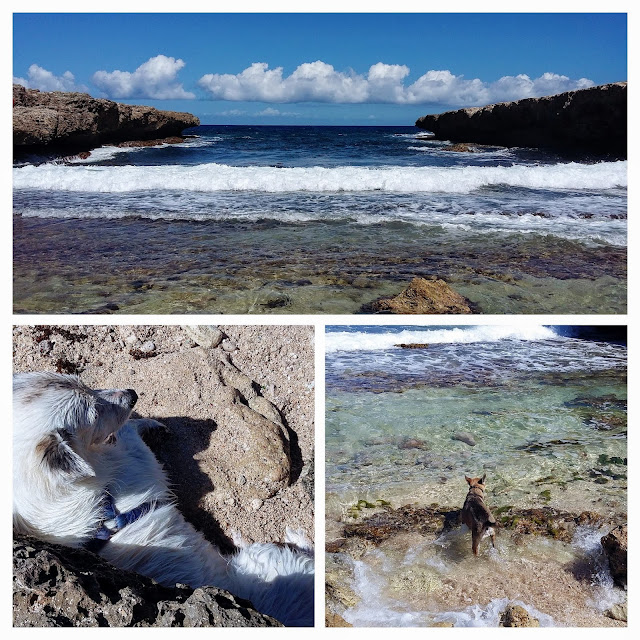 |
| The family, as it once was. From left to right: Rusty, Sam, Panchita, Sasha, Benny, Duncan, Winter. June 19, 2016. Only three of them are left today. |
When she came to us, the whole lower half of her body — from her waist to the toes of her hind legs — was completely bald. Her tail was a mess of scabs and patches of long, matted hairs. Of course, no one in the building wanted to pet her, or even feed her; unlike the other occasional strays that had wandered onto the company's parking lot lately, most of them recently abandoned and still looking good, no one wanted to encourage this raggedy mutt to stay.
So, on the evening of September 13th, having witnessed one more disgusted cringe at these intensely eager brown eyes, I let heart overcome reason and brought her home. She needed no encouragement to climb into the car; I opened the rear and called her ("Baby", or "doggie", or some such; she was still nameless then), patting the seat, and she jumped right in.
Temporary, I repeated to myself as I drove. We'll get her healthy, and in a few months she'll be ready for a forever home. Once her hair grows back — her skin issues, as unsightly as they might seem to the untrained eye, probably weren't all that serious — people would see what I already knew, that this was a gorgeous dog, remarkably smart and with a sparkling personality, who would make a family somewhere immensely happy. All she needs is a few weeks of good food, good shampoo, good meds.
After all, wasn't this the very reason why we had, just a few months before, bought our own house? So that we could provide a safe haven for dogs without pesky landlords giving us the evil eye? Yes. Yes, it was.
She was mostly healthy; no heartworm, thank the dog gods, just a bit of tick fever, and the skin problem turned out to be a flea allergy — anti-flea shampoo was all she'd need to get rid of those. But it took months for her fur to grow back. Even three years later, her back end was still kind of scraggly.
 |
| Winter (with Duncan and Rusty making faces) at the doggy beach in Jan Thiel, August 2013 — three years after she came to live with us. You can see how thin her fur was still then. |
And by then, well, we were attached.
She was a difficult dog. A larger-than-life personality. And stubborn to match. She was the most aggressive of our dogs — up to that point, anyway. She bit the gardener once. She hated strangers. Taking her to the vet was an exercise in saintly patience. She bullied other dogs, stole food, even provoked a reactive and highly aggressive pitbull at the beach one day. (And barely escaped with her life. Did she learn from it? No, she walked away from that one — after the owner had managed to restrain her dog; I, of course, was useless — with head held high, ears perked up happily, and with a look in her eye that said, "Ha. You should see the other guy.")
 |
| Winter at St. Joris with Benny and Jopie, November 28, 2017. This was the spot where that Pitbull encounter happened. Might even have been this same day. |
She was better off here, with us, where she wasn't judged, or punished; where she'd be loved anyway, in spite of her misbehaviour — maybe even because of it. And she seemed to fit in the pack, somehow; Panchita, always the Alpha, seemed to know how to make her authority stand even for Winter. And Rusty, always calm and playful, became Winter's favorite sidekick.
We didn't know how old she was. Throughout those first months of frequent vet visits, we came to the conclusion, based on her general health, that she must be around 5. She had obviously had several litters of puppies — who knows what happened to them — and her teeth were in terrible, terrible shape. A few were missing already, and several others so damaged they needed to be extracted. She probably has another five years, we were told.
 |
| On the front porch, October 27, 2016. Clockwise, starting from bottom left: Benny, Rusty, Winter, Sasha, Panchita, me. |
Five years passed, and she was still going strong. We congratulated ourselves on a job well done. After another three, she started showing only faint signs of age. A bit of stiffness in the joints after walks, some more teeth that went missing or had to be taken out. And we suspected she might be losing her eyesight somewhat. But she was still feisty, full of life, and stiff joints or not, she still seemed to believe the world was hers and the rest of us just lived in it.
And then, about 2 years ago, Rusty had a seizure — and a week later, Winter had a suspiciously similar one. We did all the tests (the ones available here on this island), but couldn't find a cause. No damage done, it seemed; they were both fine afterwards, as happy and healthy as before. Phew, we thought, having no idea that it was the beginning of the end.
 |
| The last time — according to photo record, anyway — that Rusty and Winter managed a hike. St. Joris, May 2019. |
Back in June this year, kidney failure was determined. For both of them. Rusty's was acute, but Winter's wasn't quite so bad, so we hoped — especially after Rusty declined so fast, and we had to put her down in July — that Winter would give us a few more months. Six, maybe. Maybe even a year (though the vet kind of winced at that).
She didn't. Not because she didn't want to; she was feisty and full of life till the end. But that was her; we couldn't expect anything less. She hated weakness, and she was loath to show any herself, even when she should have. For her, it was always death or glory.
There was this one time, some five years ago, when I took her on a walk to this new beach I had heard of and wanted to find. (That's Curaçao, full of secret little coves everywhere.) I miscalculated the distance and parked way too far. We did find the beach, but by the time we started making our way back to the car, it had been over 2 hours — in the searing island heat. I was running low on water both for me and for the dogs, and we were all exhausted.
About halfway to the car — still about a kilometer left to go — Winter finally sat down in a scrap of shade from a thorny bush and refused to keep going. We rested for a bit, but with little shade available for the rest of us bigger folk, and with water down to the last inch in the container, the other dogs were eager to keep moving. So I picked her up and carried her. Oh, no, she was having none of that. She wriggled and bit until I put her down again. But she really just couldn't walk. So we did that dance — pick her up, struggle with her in my arms for some twenty steps, then set her down — almost all the way back. When we were close enough, maybe three hundred meters or so, I left her in a shady spot and power-walked with the other dogs to the car, then drove back to get her. Did I find her waiting? Nope. She was sauntering, at her own short-legged pace, down the blistering red earth of the path, towards us. She must have thought I was abandoning her (which broke my heart), but did she show it? Fear? Relief? Not at all. She acted like it was all good, this was the plan all along. Nothing to see here, move along.
That was Winter.
So, as she became more and more blind, as her body began to fail her more and more, she refused to give in. She put up a brave front, and wouldn't back down. But the joy was seeping away, and no matter how lionhearted she tried to be, things were slipping out of her control. Her bladder, for instance, demanded she go out in the middle of the night — sometimes multiple times — to empty it. With all the dogs sleeping in the bedroom with us, and with her poor eyesight, that caused problems. After waking up to a few skirmishes (and a few puddles on the floor), we decided she was better off sleeping out in the hallway. She seemed fine with that — the hallway had become her safe spot during the day, too. But, as months went by, that hallway became her whole life. We noticed she was going outside less and less, and often requiring assistance to navigate the other dogs lying along the way to the patio door. In a combination of her loss of sight and the kidney failure, she was becoming more and more disoriented, more and more prone to bump into another dog — and, if this was Benny, for instance, or Jopie, the consequences could be painful.
So it became a self-fulfilling prophecy: she was afraid of going outside, so the other dogs saw her less and less, and would attack her more, so she became more afraid and went out less. In the end, she slept maybe 22 hours a day. She flinched every time another dog passed by. She couldn't find her way to the patio. She couldn't negotiate the three steps on the front porch. Her hips weren't cooperating. Her eyes weren't, either.
Was she in pain? Maybe. We wouldn't know it, because she wouldn't show it. But, after discussing all these symptoms with the vet, we agreed that she was definitely living in fear if not pain. And, inescapably, we grudgingly came to the conclusion that had been staring us in the face: her time had come. If we waited for her to show real feebleness, then we'd have waited too long: she was simply too plucky, too unshrinking, to do that. It was up to us to stop her suffering before it became so intense that she simply couldn't hide it any longer.
And so we did.
 |
| Rest easy, beautiful girl. |
Grief is the price we pay for love, so we're doing our best to embrace it, to celebrate her life and, in gratitude for the time she gave us, cherish the hole she leaves behind. She was the last of our first generation of dogs: Panchita, Frida, Rusty, and now Winter are all gone. Each of them taught us so, so much. Each of them changed our lives in ways we never even considered possible. They put up with our ignorance, patiently repeated the lesson again and again until we learned it. Their love was pure and unconditional, and we barely deserved it — but, by the time they began to leave us, they had prepared us enough to deserve the love of the other four-legged bundles of joy they left behind to keep us on the straight and narrow.
Dag, Winter. Maybe we loved you "in spite of" — but you loved us "in spite of", too, I think. Thank you so, so much for that.




.jpg)


